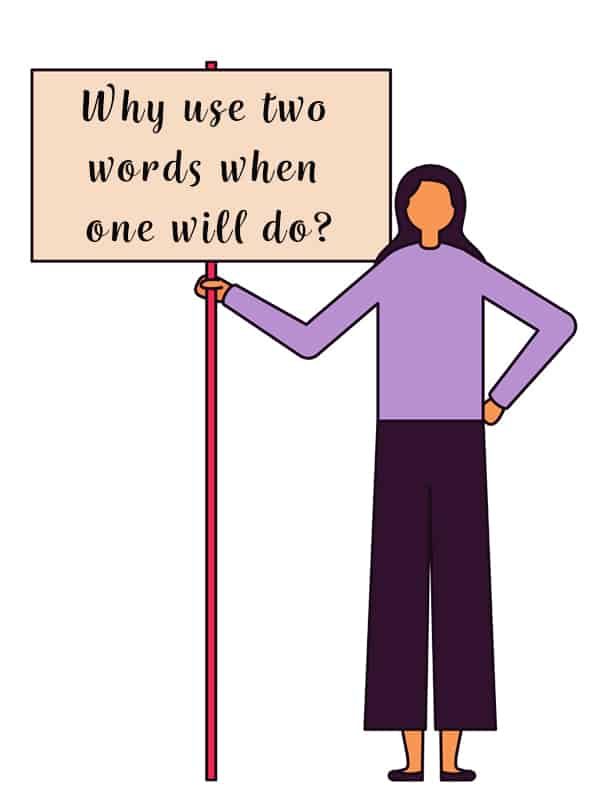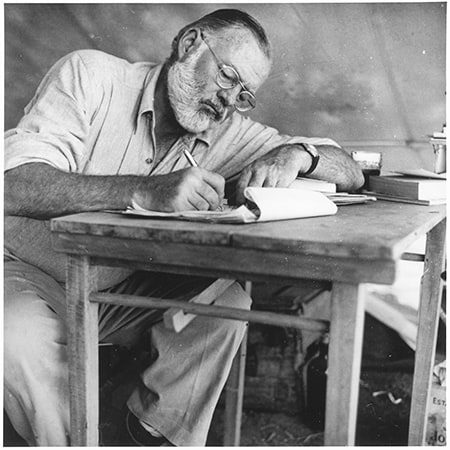When readers spend an average of 54 seconds on a web page (Yes, it’s true!), you’ve really got to work to get your content read.
Quality original writing will help keep readers on your page. But unless you have years of experience and insight, it can be difficult to engage them on a deeper level.
Here are three ways your writing can go wrong with examples and tips to help you build strong content.
Let’s make your writing more powerful, starting now!
Filler words are words that add no value.
They’re words you need to eradicate from your writing before your readers give up on you.
Do you receive emails that commence with ‘I just wanted to write …’?
And this. Do you know that when you use just in a sentence, you undermine your credibility and minimise your authority?
This is because just is an apology word.
‘I’m just checking in,’ and ‘I just called …’ and I’ll just let him know.’
Now look at how much stronger your writing could be without it.
I’m checking in, I called and I’ll let him know.
Other meaningless words are so and such.
‘It’s so healthy and such a great healthy snack.’
Remove them and you have a strong sentence that communicates authority.
‘It’s healthy and a great snack.’
Very and really also dilute and weaken your writing.
They’re timid words that reduce the strength of sentences.
‘The book was really good’ – or the stronger version: ‘The book was good.’
Really, very and quite are sometimes called intensifiers, but they weaken writing rather than enhance it.

Mark Twain disliked the word very, and offered the following advice:
“Substitute ‘damn’ every time you’re inclined to write very;
your editor will delete it and the writing will be just as it should be.”
A writer doesn’t need to tell their readers what they think, feel or believe about the topics they’re writing on.
Using these words makes it appear writers are trying too hard to impress their readers.
For example – I believe content marketing is the most successful marketing strategy at the moment.
A better version – According to a HubSpot survey, almost 80% of companies have a content marketing strategy.
Using proven examples, statistics and research makes writing stronger.
To win readers’ trust and to build credibility always use research to support the ideas you’re writing about.
Instead of ‘I think the federal budget will show a huge deficit,’ insert authority into your writing.
‘Economist Ken Henry said the federal budget will show a big deficit.’
Jerry Weissman, in the Harvard Business Review, demonstrates some clever ways to Replace meaningless words with meaningful ones.

Redundancy is when two or more words are used together that mean the same thing.
Using redundant words is a sure way to weaken your writing.
For example: Let’s briefly summarise the story.
Did you pick the redundant word?
‘Let’s summarise the story’ avoids repetition, and makes your writing more powerful.
End result – A result occurs at the end, so ‘end’ is unnecessary.
Close proximity – ‘Proximity’ is already close to something.
Circle around – Circle and around mean the same thing.
Difficult dilemma – Dilemma means ‘difficult’ so ‘a dilemma’ works fine.
Complete circle – A circle is always complete.
Very unique – ‘Unique’ is an absolute’ so it can’t be modified by ‘very’.
New beginning – A beginning is always ‘new’.
Free gift – If it’s not free, then it’s not a gift
Absolutely certain – ‘Unique’ is an absolute’ so it can’t be modified by ‘very’.
First began – If you begin it, then it’s the first time.

It should be easier now to identify words or phrases that say the same thing twice.
For example – ‘Many homeless men, who had nowhere to live, were at the soup kitchen.’
But don’t fall into the trap of repeating a concept or idea expressed in one sentence in another sentence.
Powerful writing is concise in both words and ideas.
The following two sentences say the same thing using different words.
The survey was composed of questions with multiple-choice options.
Survey recipients selected one of a series of answer options.
If a single sentence lacks essential detail go back and insert more information, rather than adding a second sentence that duplicates part of the first sentence.
The survey recipients selected one of the multiple-choice options.
Powerful writing is learned through reading the work of strong writers and practising it yourself.
In his book, The Elements of Style, Cornell University English Professor William Strunk Jr. wrote:
“Vigorous writing is concise. A sentence should contain no unnecessary words, a paragraph no unnecessary sentences, for the same reason that a drawing should have no unnecessary lines and a machine no unnecessary parts.”
A good writer, he added, should “make every word tell”.
Author Stephen King said “I believe the road to hell is paved with adverbs, and I will shout it from the hilltops.”
Adverbs are words that modify verbs, adjectives or other adverbs.
Often adverbs end in ‘ly’.
For example – happily, thoughtfully, slowly, easily and patiently are adverbs.
These adverbs are usually formed by adding ‘ly’ to the end of an adjective.
So, we’ve just formed adverbs from the adjectives – happy, thoughtful, slow, easy and patient.
But technically, not all ‘ly’ words are adverbs.
For example, in the sentence: ‘The lonely boy was sitting by himself,’ lonely is an adjective that modifies the noun ‘boy’, so it is not an adverb.
Now that we know what an adverb ending in ‘ly’ is, let’s look at how we know these words weaken writing.

Nobel Prize-winning author Ernest Hemingway’s novels and short stories serve as a good model for business writing.
After high school, Hemingway went on to train as a journalist and he applied those skills to his fiction writing.
In research for his book Nabokov’s Favorite Word is Mauve: What the Numbers Reveal about the Classics, author Ben Blatt used statistical tools to analyse text from 1500 books.
Blatt found that books considered ‘great’ had fewer than 50 adverbs in every 10,000 words.
Hemingway used only 80 ‘ly’ adverbs per 10,000 words. His writing includes both short and long sentences – but they are always simple, unadorned, direct and clear.
“A writer’s style should be direct and personal, his imagery rich and earthy, and his words simple and vigorous.”
– Ernest Hemingway
Abolishing adverbs from your writing is easy when you know how.
‘She smiled happily, for example, is redundant because a smile is an expression of happiness.
Jane was unhappy, she said angrily.
Removing the adverb angrily makes your writing stronger.
Strike out other adverbs from your writing such as definitely, truly, really and extremely and see how to make your writing more powerful.
Occasionally, you’ll use an adverb in your writing that works tremendously (yes, that was an adverb).
By all accounts keep it, if it’s the perfect word.
But remember to use adverbs wisely and review your writing to check whether they can be removed.

You might also be interested in reading How to be a good content writer, which shows how authentic storytelling is the best way to successfully promote your goods or services.
For more writing tips read 9 common errors every writer should know about.
Also, take a look at my Complete guide to conversational writing to see how to make our business writing more human and engaging.
Sharon is a content writer and award-winning editor. After acquiring two masters degrees (one in education and one in editing and comms) she worked in the publishing industry for more than 12 years. A number of major publishing accomplishments came her way, including the eighth edition of Cookery the Australian Way (more than a million copies sold across its eight editions), before she moved into corporate publishing.
Sharon worked in senior roles in medical colleges and educational organisations until 2017. Then she left her role as editorial services manager for the corporate arm of a university and founded Textshop Content – a content writing and copyediting agency that provides services to Australia’s leading universities and companies.
